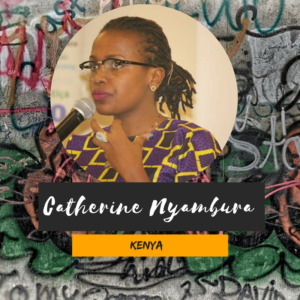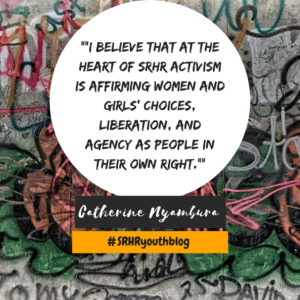#SRHRyouthblog: Looking back, Looking forward by Catherine Nyambura

I grew up in one of Nairobi’s biggest slums- Mukuru Kayaba. My mother was one of the women trained by AMREF to assist women giving birth. Listening to my mother’s daily debriefs I became acutely aware of the high rates of maternal mortality in our community from an early age. Later on in my first year of university where I studied Biomedical Science and Technology, one of my lecturers Dr. Mbai was taking us through the MDGs and terms like infant mortality and maternal mortality came up. I remembered my friend Sabina, who had died weeks after giving birth, and it dawned on me that Sabina was now a statistic of maternal mortality.
While in University, I joined the Gender Students League, a social movement of students aiming to create a space for dialogue about gender equality and women’s empowerment, and to also influence University policy on gender related issues. At the center of these conversations was sexual and reproductive health and rights (SRHR). Having risen through the ranks to become the Organising Secretary, I engaged in advocacy towards influencing the first Kenyan public university Gender Policy and Sexual Harassment Policy. After completing my undergraduate degree, I transitioned to my first job at Dandelion Kenya, an SRHR organisation.
Over the years, my SRHR activism has involved movement building; leveraging digital and social media for campaigning; community mobilisation and driving community dialogues on various SRHR issues; policy advocacy and capacity building, with a particular focus on young women and adolescent girls. In my current role at FEMNET, I work with young women from various African countries through training, capacity building, communications and advocacy to strengthen their movements and voices so they can influence policies on SRHR. At the moment, a typical day for me may consist of amplifying the voices of diverse young women SRHR activists through social media, by hosting them on twitter chats, or featuring them on blogs. I also engage in policy dialogues at the national, regional and global level, such as in influencing ongoing bills and policies in Kenya, as well as policy processes at the African Union and United Nations.
My work as an SRHR activist has had many highlights already. I founded the #SRHRDialogues – a digital media platform for stakeholder engagement, advocacy and information sharing on SRHR, which resulted in me being awarded one of the 120 Under 40 Awards for young reproductive health champions. As a Women Deliver Young Leader, a fellowship for young leaders advancing sexual health & rights, I have been able to access various decision making platforms and funding opportunities to advance and amplify my work on SRHR. I have also joined the Kenyan Government delegation on several occasions to the UN Commission on the Status of Women, the Commission on Population & Development, the High level meeting on AIDS, and addressing the UN General Assembly in 2014. These experiences provided a platform to participate in supporting global advocacy towards ensuring the recognition of SRHR as central to sustainable development, such as during the formulation of the 2030 Agenda for Sustainable Development, and reviews of the International Conference on Population and Development. As a young woman, such opportunities to participate in supporting global SRHR advocacy are key, as global decision making on these issues translates into how my government prioritise policy making, programming and investments about my health and my future. Being invited to meet President Obama whilst he was visiting Kenya in order to bring his attention to the consequences of the Helms Amendment, this was also a big milestone for me.
My journey has not been without challenges. I think one of the biggest challenges so far has been funding; both to scale up projects, and to continuously participate in regional and global platforms that present an opportunity to amplify community voices. Moreover, transitioning from being an activist to being an ‘expert’ has not been easy. Adolescent girls and young women are often limited to being those in charge of sharing realities on the ground. We have to work very hard to be seen as ‘experts’, a term which is often very male and global Northern dominated. Despite these challenges I have been able to achieve a lot, and for this I thank all those who have been supportive, who have provided mentorship and access to platforms at various levels for me including investment by UNFPA and others.
 I believe that at the heart of SRHR activism is affirming women and girls’ choices, liberation, and agency as people in their own right. As I see it, my role as a SRHR activist is to stand up for the struggles of the friends I lost to maternal mortality, the school mates who dropped out of school and their future curtailed due to teenage pregnancy, and those others lost to AIDS. Looking forward, I am hopeful that the controversy that surrounds SRHR will soon be behind us. I am looking forward to a point where the debate, discourse and policy-making platforms will be devoid of bias. This is because, it is crucial that we begin to realise that we will not be able to achieve the 2030 Agenda without investing in SRHR. As such, in the long term I hope to empower a critical mass of women to be policy makers and decision makers. Experts rather than victim story-tellers. I hope to influence policy so that topics such as abortion and LGBTQIA rights are no longer controversial. Finally, I hope to smash the patriarchy, if even just a little bit!
I believe that at the heart of SRHR activism is affirming women and girls’ choices, liberation, and agency as people in their own right. As I see it, my role as a SRHR activist is to stand up for the struggles of the friends I lost to maternal mortality, the school mates who dropped out of school and their future curtailed due to teenage pregnancy, and those others lost to AIDS. Looking forward, I am hopeful that the controversy that surrounds SRHR will soon be behind us. I am looking forward to a point where the debate, discourse and policy-making platforms will be devoid of bias. This is because, it is crucial that we begin to realise that we will not be able to achieve the 2030 Agenda without investing in SRHR. As such, in the long term I hope to empower a critical mass of women to be policy makers and decision makers. Experts rather than victim story-tellers. I hope to influence policy so that topics such as abortion and LGBTQIA rights are no longer controversial. Finally, I hope to smash the patriarchy, if even just a little bit!
Follow Catherine on Twitter!
